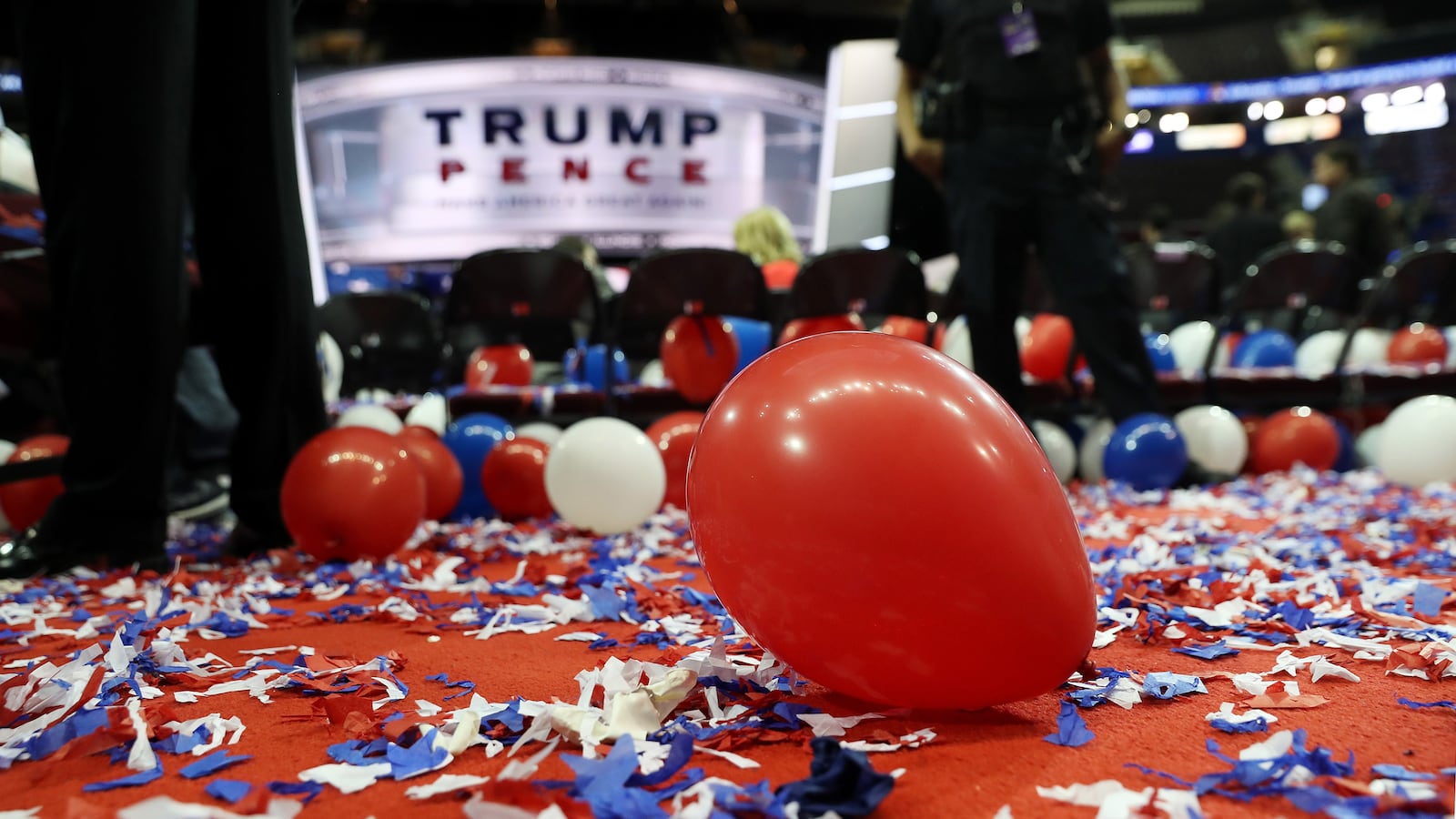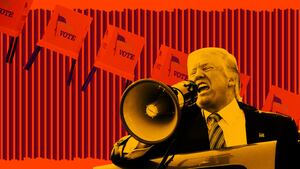Donald Trump’s demand for a spectacle when he formally accepts the Republican nomination in August has sparked a mad dash inside the president’s party to woo him to other states despite the difficulties such a grandiose event could pose.
Republican governors in Florida, Georgia and Tennessee have publicly angled for the convention since Trump’s initial warning to North Carolina on Memorial Day that the state would lose the chance to host the event, a threat he followed through with on Tuesday night.
But what such a gathering would look like remains unclear and there is little time to spare. On the local level, officials in possible host cities didn’t sound excited at the prospect of putting on such a massive event as their regions recover from a pandemic.
A spokesperson for the city of Tampa, host of the 2012 GOP convention, said it “would be unrealistic and irresponsible to consider that,” while the press secretary for Nashville’s mayor said “we have no plans to use our limited public funds to recruit this convention at this time.” A spokesperson for the Democratic mayor of Phoenix, meanwhile, stated that Arizona “is not over COVID-19” and that “discussions about gatherings of any kind during this pandemic must be led by medical professionals and no one else.”
Contrast that with the outright thirstiness of the GOP governors aiming to land the big event. “Nashville is the best city in America to hold a convention, and hosting the Republican National Convention in Nashville would certainly help accelerate the economic recovery for local businesses,” a spokesperson for Republican Gov. Bill Lee said. “We welcome the RNC's interest and would be happy to host the convention in Tennessee.”
The Nashville mayor’s spokesperson, meanwhile, told The Daily Beast that as of Wednesday afternoon there was no communication between the mayor and the governor about the convention coming to the city.
Members of Tennessee’s Republican delegation to Congress, some of whom have close ties to Trump, have been publicly pushing for Nashville, including Sen. Marsha Blackburn, who was a vice chair of Trump’s presidential transition and nominated him for a Nobel Peace Prize. Rep. Chuck Fleischmann, whose district is an hour or so east of Nashville, has tweeted positively about having the convention in his city, and believes the region is on the shortlist to get the nod.
Despite the public overtures, it’s still unclear how any transition from Charlotte will play out. An RNC official said in a statement Wednesday that “the celebration of the president’s acceptance of the Republican nomination will be held in another city.”
But some action could remain in North Carolina, according to the party, with the official noting “we still hope to conduct the official business of the convention in Charlotte.” That sets up the possibility that the RNC’s activities in August could play out in two different states. A Charlotte official said during a press conference Wednesday that discussions were ongoing, but added that the city was looking to “clarify the intentions of the RNC in terms of exactly what they're planning on doing,” in the city.
“As of right now, this very moment, all the parties are continuing to move forward as if the RNC will be in Charlotte,” Charlotte’s city attorney told reporters.
While the president’s tweet was met with glee by those hoping to benefit from the move, some in Trump’s circle groaned and urged a quick in-and-out approach.
“Logistically it’s a nightmare,” Ed Rollins, chairman of the pro-Trump political group Great America PAC, told The Daily Beast.
For Rollins, who helped lead communications strategy during the 1980 Republican convention in Detroit, Trump would be wise to “try and limit the show” and bill the event as more of a “meeting” than a big jamboree, while saving some money wherever possible.
“I would argue, let’s get it on, get something picked, get in there, and get out as quickly as possible. Don’t drag it out. And control the cost, because ultimately, very few people will change their votes,” he said.
“It’s not going to be the greatest convention ever.”
The change also has sparked a growing anticipation of infighting in Trump’s orbit, pitting career Republican National Convention workers against the “let Trump be Trump” camp who dismiss the RNC lifers as bureaucratic bores who get “awful comfortable in their hotel suites,” as one Trump ally put it, unable to adequately adapt to Trump’s way of doing things.
“The people doing the convention this year were wearing bell bottoms the first time they did it,” said a former senior adviser to Trump’s 2016 campaign. “My advice to the president is this: if someone tells him it cannot be done, replace them immediately. Replace them immediately!”
Four years ago, the official recalled the dread of Republican Party officials who repeatedly pushed back against then-nominee Trump’s logistical preferences and bombastic approach to convention campaigning as something that will likely pop up again in August.
“The one thing that is the coin of the realm in every Republican convention is the metaphysical certainty of how things are done,” the official said. “In 2016, one of the most difficult things that the Trump team faced was the following answer: ‘we just don’t do it that way.’ Now, in 2020, you’re gonna do it that way.”
But the uncertainty is already causing some to worry about how the process will come together with short notice. Asked if other Trump allies are privately freaking out that certain cities, including those thought to be on the president’s shortlist, might not be able to pull it off seamlessly, the former senior adviser said “yes,” while insisting that it’s still “totally doable.”
“Absolutely doable,” the former senior adviser projected. “I can name 10 cities right now that would take it right now,” the source added, declining to elaborate about specific areas.
Despite the immense benefit that a convention could bring to a city after coronavirus hollowed out local economies, leaders of some of the cities that could host the convention have already shown reluctance to vie for the event, a reality that could present a hiccup for Trump.
“There are states that the president would rather be in than others,” the former senior adviser flatly acknowledged.
Among some Republicans, one particular city in Florida—a must-win battleground for both Trump and former Vice President Joe Biden—is seen as a leading contender. Jacksonville’s Republican mayor Lenny Curry tweeted Tuesday afternoon that “the city is ready for world class events &ready show the world we are open for business.”
While other cities and politicians made their own plays to bring the convention to their area, Duval County’s GOP chair was optimistic that the convention would be brought to Jacksonville. In an interview with The Daily Beast, Dean Black touted Jacksonville as “the lead city” in the convention sweepstakes.
“Normally a convention is planned years in advance and to move a vast enterprise like that on short notice, although challenging, we can absolutely do it,” Black said. “And if I were a betting man, I would put money on the fact that we're about to.”
Another critical swing state, Arizona, is thought to be a possible dark horse to land the RNC. While Republican Gov. Doug Ducey hasn’t commented on bringing the show to the state, one of the president’s top Republican supporters in the House, Rep. Debbie Lesko, tweeted, “Unlike the NC Governor, I'm ready to welcome the RNC to AZ!” Lesko added that the home stadium of the NFL’s Arizona Cardinals, located in her Phoenix-area district, “would be the perfect place to kick off a Trump Victory in 2020.”
And Kelli Ward, the chair of the Arizona Republican Party, pitched it in an op-ed in the state’s largest paper, offering Republicans the chance to cloak Trump in the mantle of Arizona’s own Barry Goldwater, all while avoiding the “debilitating summer humidity” of Florida and Georgia, though August temperatures in Phoenix routinely reach a dry 120 degrees.
Trump first began threatening to pull the convention from Charlotte on Memorial Day, further escalating the tension a day later as he envisioned a grandiose event for his second nominating convention, coronavirus be damned.
The ensuing back and forth between the RNC and North Carolina Gov. Roy Cooper’s administration publicly appeared to make little progress in the last week. The final straw appeared to be a letter Cooper, a Democrat, sent Tuesday emphasizing a scaled back event instead of the full convention that Republicans felt they should have during the pandemic.
In a trio of tweets later that night, Trump blamed Cooper for “not allowing us to occupy the arena as originally anticipated and promised” as he announced the party would now find another state.
That decision confirmed the worst fear of some businesses in the Charlotte area who had already seen their bottom lines dented by the public health crisis, with one limousine company telling The Daily Beast last week “it's going to cripple us.”
It was also met with disappointment from some in North Carolina, a state with a crucial Senate race that could help decide which party controls the chamber next year.
Anita Brown, the vice chair of North Carolina’s Cabarrus County Republican Party, compared Trump’s withdrawal of the convention from Charlotte to high school seniors who didn’t get to have their high school graduation due to the pandemic.
“I think it’s unfortunate for Charlotte and really for the rest of the country,” Brown said. “I don't know where they could put it that it could be done any better.”









